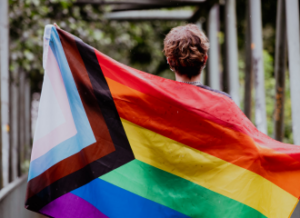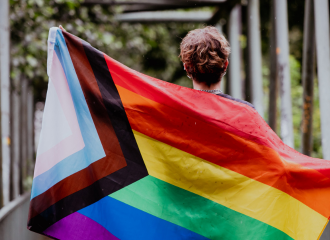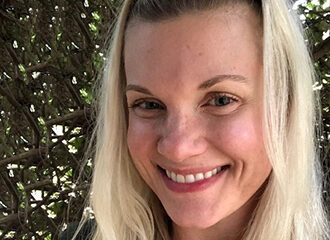In this post, we explore important mental health resources for members of the LGBTQIA+ community, especially those who might be dealing with or recovering from an eating disorder.
 Pride Month occurs each June and serves as a month-long celebration of the LGBTQIA+ community. Pride Month is an important time to commemorate queer communities and individuals who have fought for LGBTQIA+ rights, as well as those who continue fighting for equity and inclusion across the U.S.
Pride Month occurs each June and serves as a month-long celebration of the LGBTQIA+ community. Pride Month is an important time to commemorate queer communities and individuals who have fought for LGBTQIA+ rights, as well as those who continue fighting for equity and inclusion across the U.S.
Originally created to commemorate the 1969 Stonewall Uprising in New York, Pride Month celebrations now occur in every major city and many other communities across the country. After Stonewall many major figures, especially those who were transgender or people of color, were left out of early Pride celebrations. Many folx who were on the front lines of the Stonewall uprising and protests are those who are still absent from history books and are being targeted by physical violence, as well as legislation that will ultimately reduce visibility, create stigma and shame, and impact mental health.
Eating Disorders and the LGBTQIA+ Community
Members of the LGBTQIA+ community may face unique challenges that contribute to their vulnerability to eating disorders. The pressures to conform to societal standards, fear and experience of rejection or discrimination, systemic homophobia or transphobia, and the stress of coming out or navigating gender identity can all play a role. Additionally, transgender, and non-binary individuals, may experience heightened levels of body dysphoria, further exacerbating the risk of developing an eating disorder.
It’s crucial to raise awareness, provide support, and foster a safe environment that embraces diversity, acceptance, and body positivity for everyone, regardless of their sexual orientation or gender identity.
This year, themes of Pride Month celebrations across the country will include “Reflect. Empower. Unite.”, “Totally Radical”, and “Power in Pride”. To support the mental health community, we have put together a working list of LGBTQIA+ resources to explore and engage in this Pride Month and beyond.
Mental Health Resources
- Trans Lifeline: Trans Lifeline is a grassroots hotline and microgrants 501(c)(3) non-profit organization offering direct emotional and financial support to trans people in crisis – for the trans community, by the trans community.
- The Trevor Project: The Trevor Project is a nonprofit organization that provides crisis intervention and suicide prevention services to LGBTQ community.
- Pride Counseling: Pride Counseling provides a platform for the LGBTQ community to get the help they need affordably and conveniently.
- GLMA (Health Professionals Advancing LGBTQ Equality): GLMA is a national organization committed to ensuring health equity for lesbian, gay, bisexual, transgender, and queer (LGBTQ+) communities and equality for LGBTQ+ health professionals in their work and learning environments.
- GLSEN (Gay, Lesbian & Straight Education Network): GLSEN provides information and resources designed to help students take action to initiate changes in their schools and communities.
- True Colors United: True Colors United implements innovative solutions to youth homelessness that focus on the unique experiences of LGBTQ young people.
- It Gets Better Project: A non-profit designed to support and remind LGBTQIA+ youth that there is hope and it does get better, showcasing stories and reflections from people all over the world.
- PFLAG: PFLAG is the nation’s first and largest organization dedicated to supporting, educating, and advocating for LGBTQ+ people and those who love them.
- SAGE (Advocacy & Services for LGBTQ+ Elders): A national advocacy and services organization that’s been looking out for LGBTQ+ elders since 1978.
Hotlines
- Trans Lifeline: 877-565-8860
- LGBT National Hotline: 888-843-4564
- National Coalition of Anti-Violence Programs: 212-714-1141
- LGBT National Youth Talkline: 800-246-7743
Therapist/Provider Directories
- Pride Counseling: Pride Counseling is an online therapy service featuring therapists who specialize in working with the LGBTQIA+ community.
- Inclusive Therapists: Inclusive Therapists offers a safer, simpler way to find a culturally responsive, LGBTQ+ affirming, social justice-oriented therapist.
- National Queer and Trans Therapists of Color Network: NQTTCN is a healing justice organization that works to transform mental health for queer and trans people of color.
Podcasts
- Making Gay History Podcast hosted by Eric Marcus
- Listen on Apple Podcasts.
- LGBTQ&A Podcast hosted by Jeffrey Masters
- Listen on Apple Podcasts.
Books to Read
- Transgender History: The Roots of Today’s Revolution by Susan Stryker
- How We Fight for our Lives, A Memoir by Saeed Jones
- Queer: A Graphic History by Meg-John Barker and Julia Scheele
- We Have Always Been Here: A Queer Muslim Memoir by Samra Habib
- A Queer History of the United States for Young People by Richie Chevat (Adapter), Michael Bronski (Author)
Conclusion
Remember that seeking help and support is a sign of strength, and there is no one-size-fits-all solution for everyone. It’s important to find resources and approaches that resonate with your personal needs and preferences. If you or someone you know is struggling with mental health issues, reaching out to a qualified mental health professional is always recommended.
Have a resource to share with us? Contact [email protected] to let us know!



